Your Senior Journey
Your Senior Journey
Boundaries After 50: A Guide to Saying No and Putting Yourself First
Disclaimer: This post contains affiliate links; I may earn a commission at no extra cost to you.
Welcome to Boundaries After 50: A Guide to Saying NO and Putting Yourself First. Have you ever said yes to something and instantly felt that twist in your stomach - that ugh, why did I agree to this? feeling?
Then comes the self-annoyance. You didn’t want to take on that task, attend that event, or commit to yet another favour - but you didn’t want to disappoint anyone or be seen as rude or selfish.
Let me tell you a quick story.
Years ago, I inherited a stack of encyclopedias from my aunt. Not just one set - medical encyclopedias, nature volumes, cookbooks (I still have those!), world history, art books… you name it.
Why did she have all those books? Because, years earlier, she hadn’t been able to say no to a door-to-door salesman. (Who, by the way, kept coming back.) One polite moment turned into a lifetime of guilt-bound book collections.
My aunt wasn’t weak. She was simply never taught how to say no.

👉 Setting boundaries is just one powerful step on your journey of personal growth, and you’re in the right place - right now - to start making a real change.
If you’re a woman over 50 and still finding it hard to speak up, say no, or put yourself first - this guide is for you.
Because saying no isn’t rude. It’s not selfish.
It’s self-respect.
And it’s a skill you can start building today.
WHY SETTING HEALTHY BOUNDARIES AFTER 50 CAN FEEL SO HARD
Setting healthy boundaries after 50 might feel unnatural, but there’s a reason it’s still hard for many of us.
We weren’t raised in an era of self-prioritising or confident “no thanks.” For many of us, pleasing others became second nature - even when it meant saying yes at the cost of ourselves. And while we might be wiser now, that habit still runs deep.
We’ve Been Trained to Please
From a young age, many of us were taught that being a “good woman” meant being accommodating, agreeable, and helpful. We learned to keep the peace, smooth things over, and not make a fuss - whether it was with family, coworkers, or even strangers.
From what I’ve seen, these old beliefs still echo in so many of us, even when we want to change.
Standing up for our time or needs? That was often labelled as being difficult or selfish.
Guilt Is the Old Program Running the Show
Even now, the moment you even think about saying no, guilt probably rises up like a wave.
“What if I disappoint them?”
“They’ll think I don’t care.”
“They might not ask me again.”
Sound familiar? That guilt is a leftover script - an outdated program still playing in your mind.

And it doesn’t help that women over 50 are often expected to be endlessly generous with their time: babysitting grandchildren, volunteering, helping ageing parents, being there for friends, listening to everyone’s dramas… and still smiling through it all.
But here’s something I want you to hold on to:
Feeling guilty doesn’t mean you’re doing something wrong. It usually just means you’re doing something different - something that finally puts you on your own priority list.
And your needs matter too.
WHAT SAYING NO WITHOUT GUILT ACTUALLY DOES FOR YOU
Learning how to say no without guilt isn’t just empowering - it’s essential for your mental well-being, especially at this stage of life.
Let’s get something straight: saying no isn’t just about getting out of things you don’t want to do. It’s not about being difficult, distant, or cold. It’s about creating a life that feels calmer, more intentional - and honestly, more yours.
When you begin to say no to things that no longer serve you - the draining commitments, the constant yeses out of guilt - something magical happens. You start reclaiming your space. Your energy. Your peace.
Let’s break down exactly what starts to shift when you learn to stand in your “no.”
It Builds Self-Trust
Every time you say no to something that drains you, you’re actually saying yes to yourself.
Yes to your intuition.
Yes to your values.
Yes to your peace.
That small act of self-protection tells your mind: I’ve got you. And the more you do it, the more confidence you build. You begin to trust that your own needs matter. You start showing up for yourself - not just everyone else.
It might feel uncomfortable at first, especially if you’re used to people-pleasing. But once you feel that inner peace, that little sigh of relief after saying no? You’ll realise it’s worth it. Every single time.
It Protects Your Time, Energy, and Health
Saying yes all the time is exhausting.
It wears you down mentally, emotionally, even physically. Carrying everyone else’s needs on your back isn’t noble - it’s depleting. And over time, it can lead to serious consequences: burnout, sleep issues, resentment, anxiety, and even chronic health problems.
You only have so much energy in a day. So when you spend it doing things you don’t want to do, there’s less left for what actually matters to you - whether that’s your health, your passions, or simply having a peaceful cup of tea without interruptions.
Saying no protects your energy. It helps you feel more like yourself instead of running on empty all the time.
It Teaches Others How to Treat You
Here’s something powerful: every time you hold a boundary, you’re teaching others what’s okay and what’s not.
People don’t always push your limits intentionally - sometimes they just don’t know where your limits are, because you haven’t clearly set them. But once you start expressing your no with calm confidence, people take notice. You shift the dynamic.
Suddenly, that friend who always assumed you’d drop everything to help might stop asking last-minute. Your adult children might start respecting your space a bit more. Even your partner might begin to understand that your time is just as valuable as theirs.
Boundaries aren’t walls - they’re guideposts. They show others how to treat you with the same care and respect you’re finally giving yourself.
It Lowers Stress and Reduces Cortisol
Chronic people-pleasing and overcommitting often keep you in a state of low-grade stress - and that means elevated cortisol levels. High cortisol is linked to weight gain (especially belly fat), brain fog, anxiety, poor sleep, and even immune suppression.
Setting boundaries helps break that cycle. But if you're already feeling overwhelmed or running on empty, it’s not just about learning to say no - it’s also about giving your body the support it needs to calm down and recover.
If that’s where you’re at right now, I’ve put together some simple strategies and stress-busting supplements specifically for women over 50 that can help. You’ll find them in this post: Best Stress-Busting Supplements for Women Over 50: Relieve Stress and Anxiety!
It Clears the Fog: Get Real About Your Feelings, Needs, and Boundaries
When you stop automatically saying yes, you create mental space to ask: What do I actually want?
This builds emotional intelligence. You become more attuned to your real feelings, boundaries, and values - which helps you make clearer, more grounded decisions.
Midlife is the perfect time for this kind of reflection - especially as we start reevaluating priorities, relationships, and how we want to spend our energy moving forward.

And while learning to say no is a powerful start, pairing it with something like a simple mindfulness routine can really deepen that clarity. It helps quiet the mental noise and brings you back to you. I’ve shared how to start small in this post: Building a mindfulness routine.
It Leads to Deeper, More Respectful Relationships
It might sound counterintuitive, but saying no can actually strengthen your connections. How? Because when you stop overgiving, resentment goes down - and authenticity goes up.
When you express your true limits, the people who truly respect and care about you will honour those boundaries. Relationships based on mutual respect always outlast ones built on silent self-sacrifice.
Saying No Can Seriously Boost Your Life Satisfaction
When you start saying no to what drains you, you make room for what really matters - your health, peace of mind, personal growth, and freedom.
Psychology Today highlights that setting clear, healthy boundaries tends to reduce stress, ease anxiety, and boost self-confidence. People who communicate and uphold their limits often report feeling more grounded, self-respecting, and in control of their lives.
📌 Takeaway: The more aligned your yeses and nos are with your true self, the more fulfilled and grounded you feel.
💡 Quick Recap – What Saying No Actually Gives You:
✅ Less stress, more peace
✅ Lower cortisol and better health
✅ Clearer decision-making
✅ Healthier, more respectful relationships
✅ Higher self-esteem and self-trust
✅ More time for you
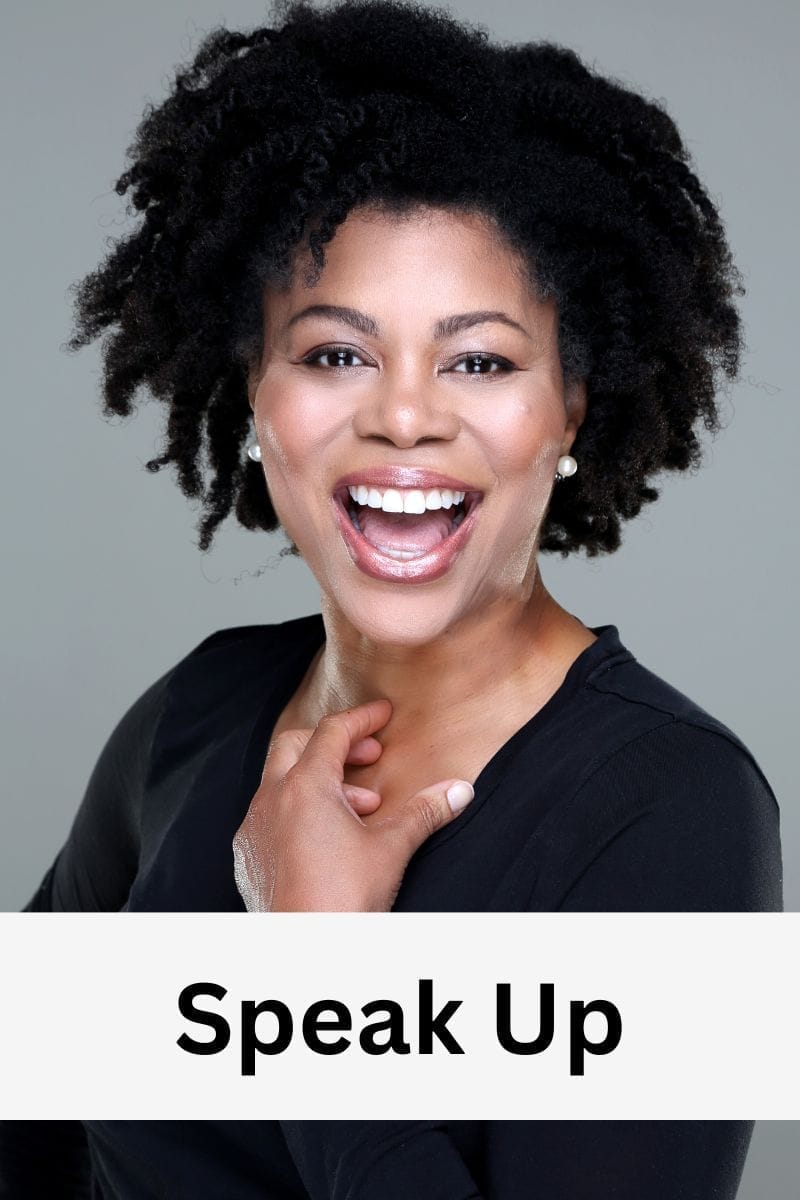
Want to Speak Up With Confidence?
If you’re ready to feel clearer, stronger, and more grounded when you communicate, I genuinely recommend Speak and Inspire by Mindvalley. It’s not just about public speaking – it’s about finding your voice in everyday life.
Affiliate link: I may earn a commission if you join, at no extra cost to you. I only share what I truly believe in.
CHECK OUT:
SURPRISING BOUNDARY-SETTING TACTICS THAT ACTUALLY WORK
(This Is Where It Gets Good)
Most advice on boundaries sounds lovely… until you’re face-to-face with someone and your “no” melts into a guilty “okay, fine.”
So this chapter? This is the gold. Tactics you can try right now - no therapy speak, no abstract pep talks. Just real-life ways to protect your energy without losing your kindness or your cool.
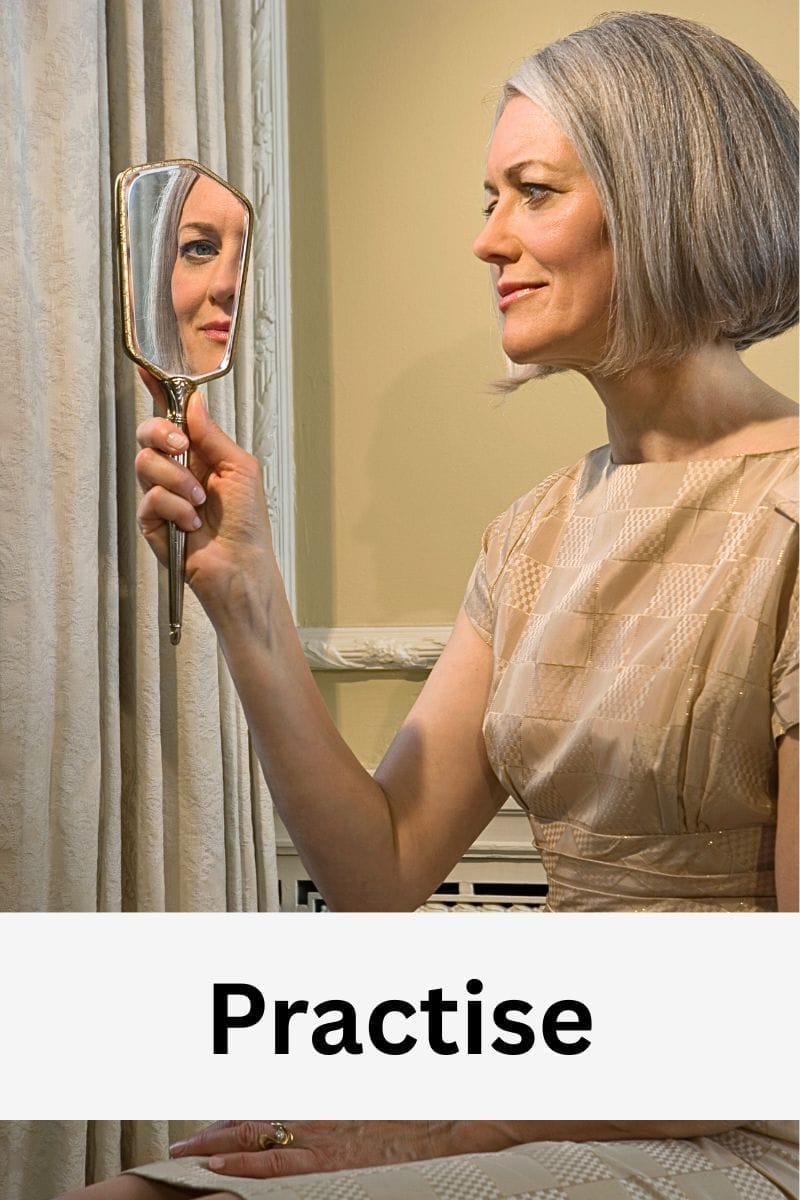
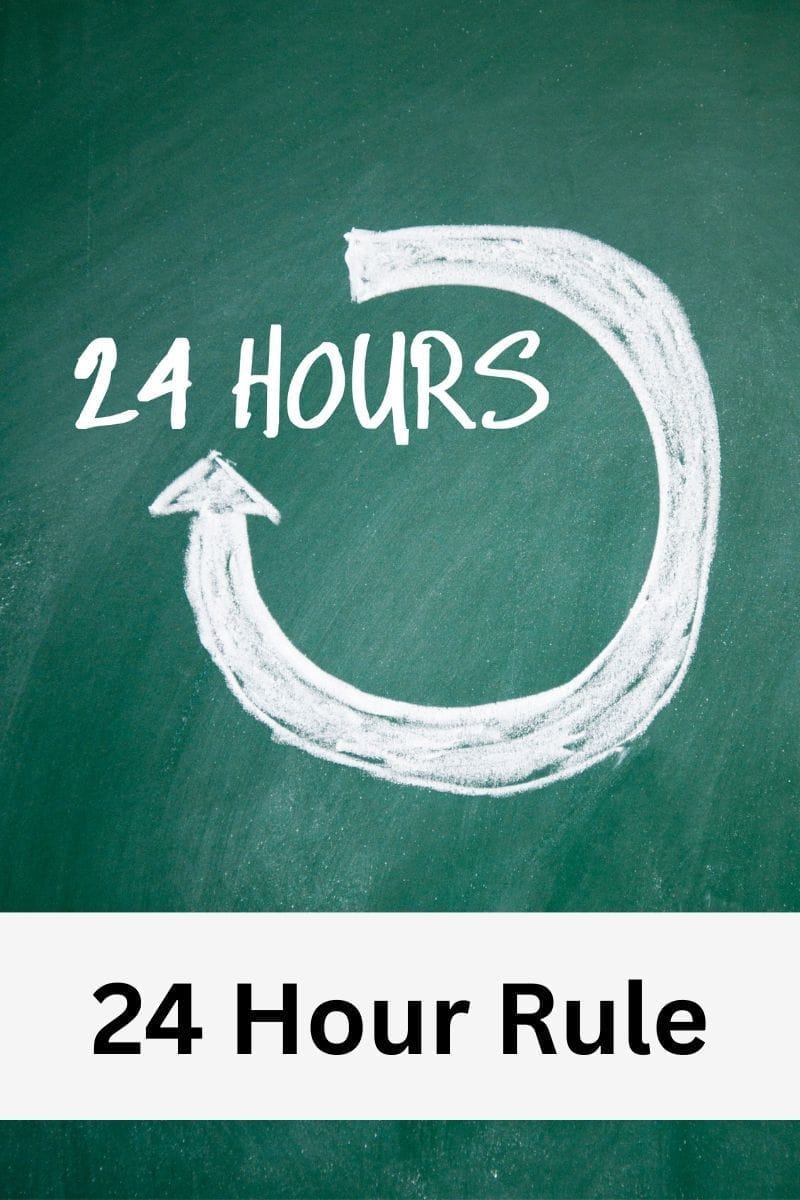
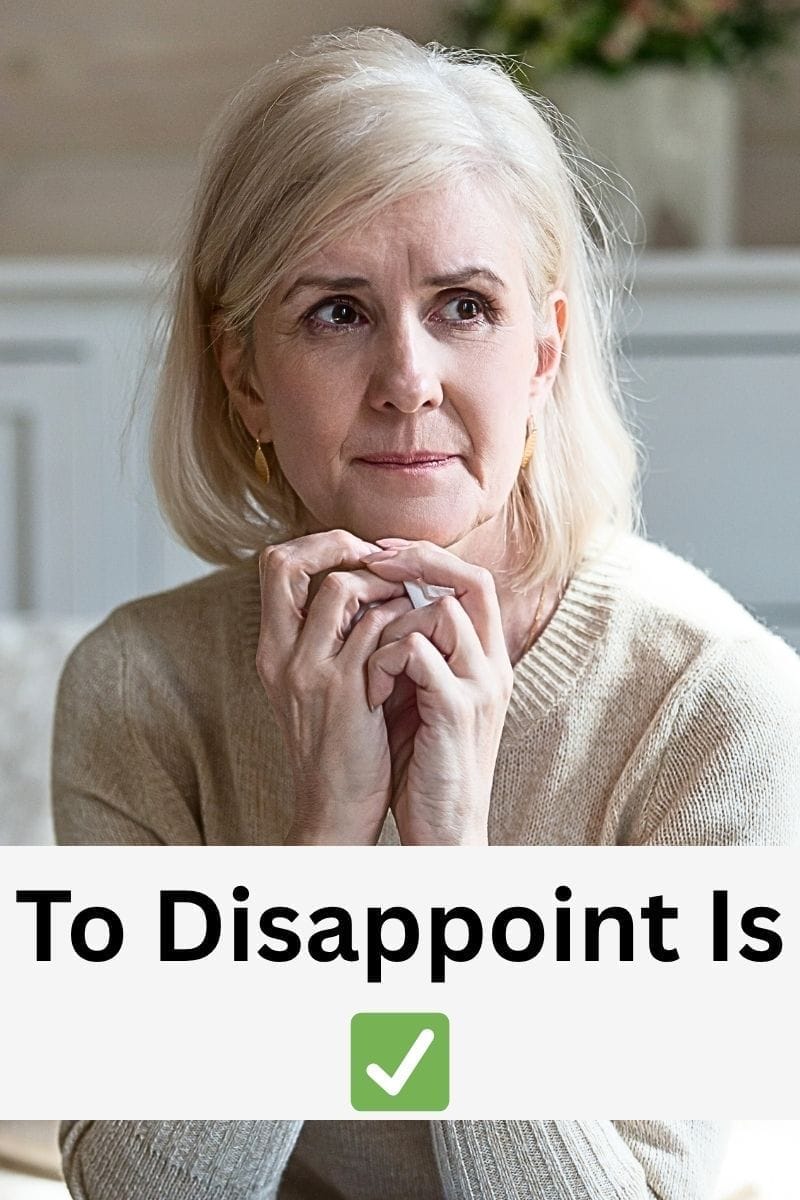
Ready to Say No? These Tactics Make It Easier:
1. Practice Saying “No” in the Mirror – get comfortable with speaking up
Sounds ridiculous? Do it anyway.
’m telling you, something happens when you say “no” to your own face. It’s a mini dress rehearsal for the real thing - and the more you practice, the easier it gets when it’s showtime.
Here’s how:
Stand in front of the mirror. Look yourself in the eye. Say things like:
“No, I’m not available.”
“That’s not going to work for me.”
“Thanks, but I’m going to pass.”
Why it works: You’re training your body and voice to stay steady. Watch your facial expression, your posture. Do you sound apologetic? Nervous? With practice, you’ll start to sound - and feel - solid.
2. Keep a List of Go-To “No” Phrases (So You’re Never Caught Off Guard)
This one really helps.
When you’ve got phrases ready, you don’t freeze. You don’t panic. You don’t blurt out “sure!” when every cell in your body is screaming nooo.
Stick these on your fridge, your bathroom mirror, or in the notes app on your phone:
Quick, Clear, and Kind:
“Thanks for thinking of me, but I’m going to pass this time.”
“I’m not available for that right now.”
“That doesn’t work for me, but I hope it goes well for you.”
“I need to take care of something else today, so I won’t be joining.”
“I’m focused on other priorities right now - thanks for understanding.”
"I've said yes a lot before, but I need to make more time for myself."
“I’ve already made a commitment to myself not to take on anything extra this week.”
“That sounds great, but I’m not the right person for this.”
“I’ve given this a lot of thought, and my answer is no.”
“I know it’s not what you were hoping for, but my answer’s no - I hope you can understand.
One key tip? Use “I” statements. They keep the focus on your needs without sounding defensive or aggressive. You're not blaming or explaining - you're simply stating your truth.
3. The 24-Hour Rule - Stop Saying Yes Immediately
Here’s a game-changer: Don’t answer straight away. Just don’t.
Try this line: “Let me think about that and get back to you tomorrow.”
Simple, right? But so powerful. It buys you time to breathe, reflect, check your calendar (and your gut), and respond without pressure. It’s amazing how many “yeses” turn into “actually… no, thanks” after 24 hours.
4. Use Your Phone As a Boundary Tool
Your phone can either drain you or protect you. Choose the second option.
Try this:
Put your phone away or turn off notifications after 8pm. You don’t need to be “on” for anyone all night.
Exit or mute group chats that drain you (you don’t owe an explanation).
Use auto-replies (on iPhones) like: “Currently offline to recharge. I’ll respond when I can.”
5. The “Do I Really Want This?” Filter - Be honest
Pause and ask yourself if this is something you truly want to say yes to. Being honest with yourself helps you make choices that respect your needs and limits.
If it’s not a clear yes - it’s a no.
Ask yourself: “Will I actually want to do this when the day comes?”
If you feel even a little unsure, take that seriously.
It’s easy to say yes in the moment and regret it later - especially when you’re trying to be kind or helpful.
And if your answer is “maybe”? That’s often just a polite way of avoiding the real answer. Give yourself permission to be honest - it’s not selfish, it’s self-respect.
6. Give Yourself Permission to Disappoint Others
Here’s a hard truth: sometimes, protecting your energy means disappointing someone else. And that’s okay.
You are not everyone’s solution. You are not a permanent support line. You are not selfish for choosing yourself.
Real talk from me to you:
It’s not your job to keep everyone happy - especially when it drains your joy.
Repeat this: I am allowed to say no, even if it makes someone uncomfortable.
You’ll survive their disappointment. And you’ll gain something way better - your own respect.
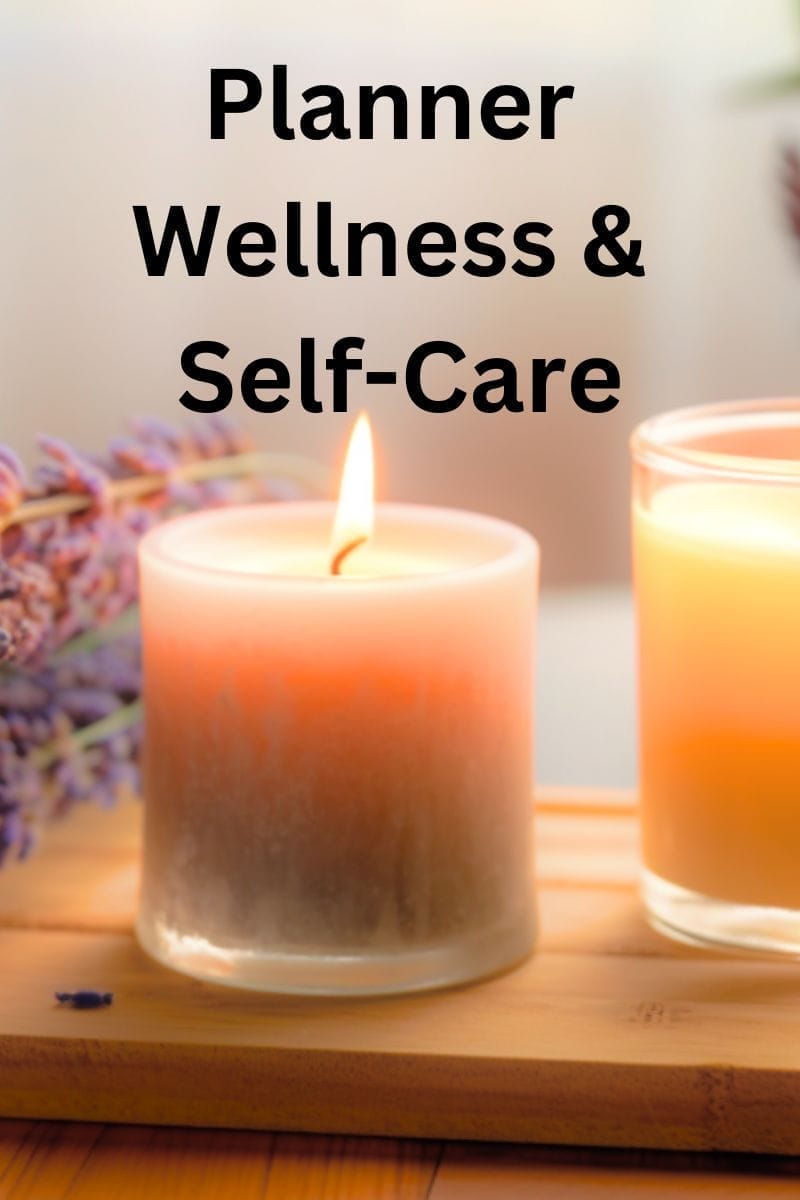
Bonus Tip: Wellness Planner
Ready to start saying no with confidence? Download my Wellness & Self-Care Planner to help you put yourself first every day. You can check it out here: Wellness & Self-Care Planner.
7. Make Self-Care Non-Negotiable - Do More of What You Love
When you regularly do things that truly nourish you - whether it’s a daily walk, journaling, quiet time with a good book, or simply enjoying a proper lunch in peace - you naturally feel more grounded.
And when you’re grounded, saying no to what pulls you off track becomes much easier. Prioritising yourself reminds you that your needs matter too. That inner strength is what helps you stand firm and own your no.
REAL-LIFE BOUNDARY EXAMPLES WOMEN OVER 50 FACE
- AND HOW TO RESPOND
Setting boundaries isn’t always about big dramatic decisions. Most of the time, it’s the small moments where you feel the pull: guilt, people-pleasing, or that familiar “ugh” in your stomach.
These examples will probably feel close to home - because this is where real change starts.
“Can You Watch the Kids?” — The Guilt-Laced Yes Trap
Your daughter calls. She’s running late. Again. “Mum, could you just grab the kids after school?”
Of course you could. But the truth is, you already said yes three times this week, and you’ve barely had five minutes to yourself.
Instead of defaulting to the automatic yes, try:
“I love spending time with them, but I’ve been feeling a bit run down. Can we plan a time that works better for both of us?”
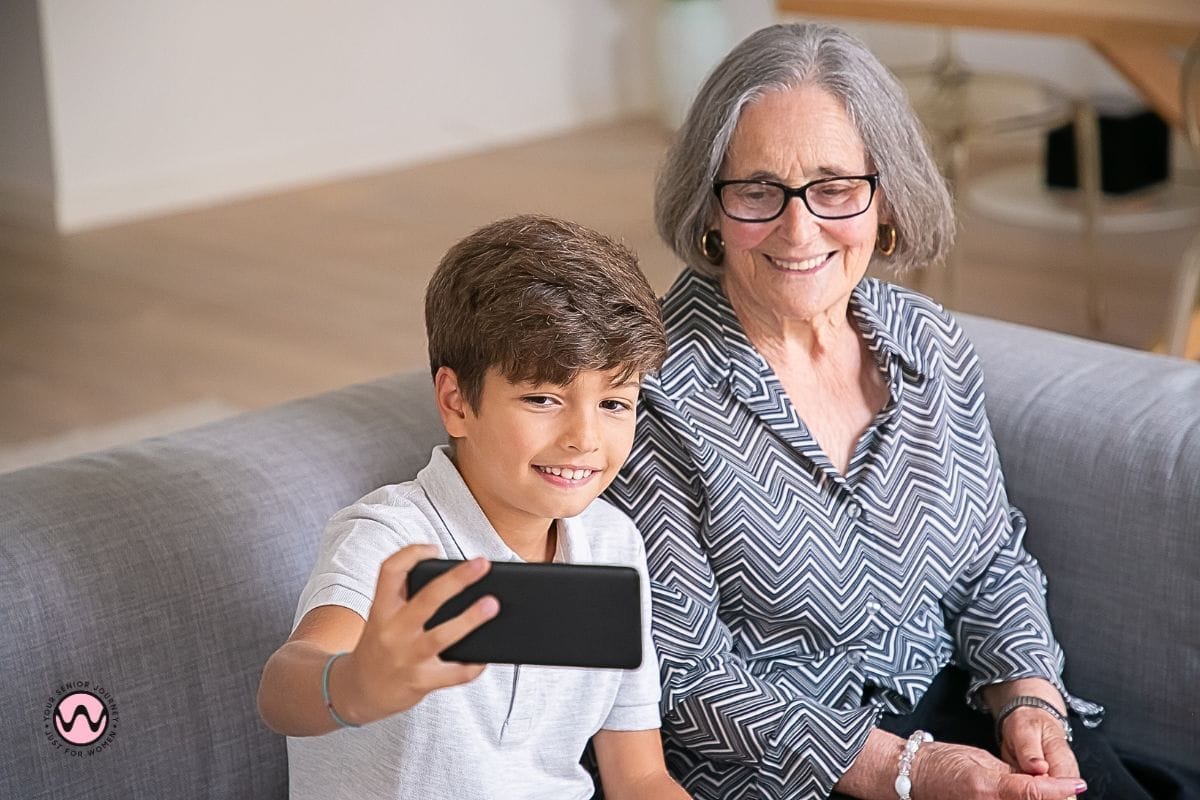
Or, even simpler:
“I’m not available today, but I’d love to have them Saturday morning.”
Boundaries don’t mean you don’t care - they mean you care about your well-being, too.
The Friend Who Always Dumps Her Problems on You
We all know that one friend who’s always knee-deep in drama. You ask how she’s doing… and two hours later, you're emotionally exhausted, and she hasn’t asked about you once.
If it’s starting to feel like too much, try gently steering things toward lighter ground:
Try saying:
“I find this conversation a bit heavy right now. Would you mind if we switched to something a little lighter? I could really use a good laugh today.”
Or if it’s become a bit of a pattern and you're ready to be more direct:
"I’ve been feeling like our conversations have gotten pretty heavy lately. I care about you a lot, but I need something a little lighter right now."
It’s not mean. It’s honest. And it might be the nudge she needs to get real support elsewhere - not just lean on you like an unpaid therapist.
“Why Don’t You Stay the Weekend?” - When Your Partner Wants More Than You Can Give
Maybe you're dating someone new. Or your partner has retired and suddenly wants all your time. They suggest spending the weekend together - again. But your soul is screaming for space, a book, and silence.
Instead of forcing yourself into another “together” weekend when you’re secretly craving alone time, try saying:
"I really love our time together, but I also need some time to myself to recharge. How about we plan something for Sunday afternoon instead?"
Or this, if you want to be clear without offending:
"I really enjoy being with you, and and having a bit of space now and then helps me feel more relaxed and happy when we’re together.”
If they’re right for you, they’ll understand.
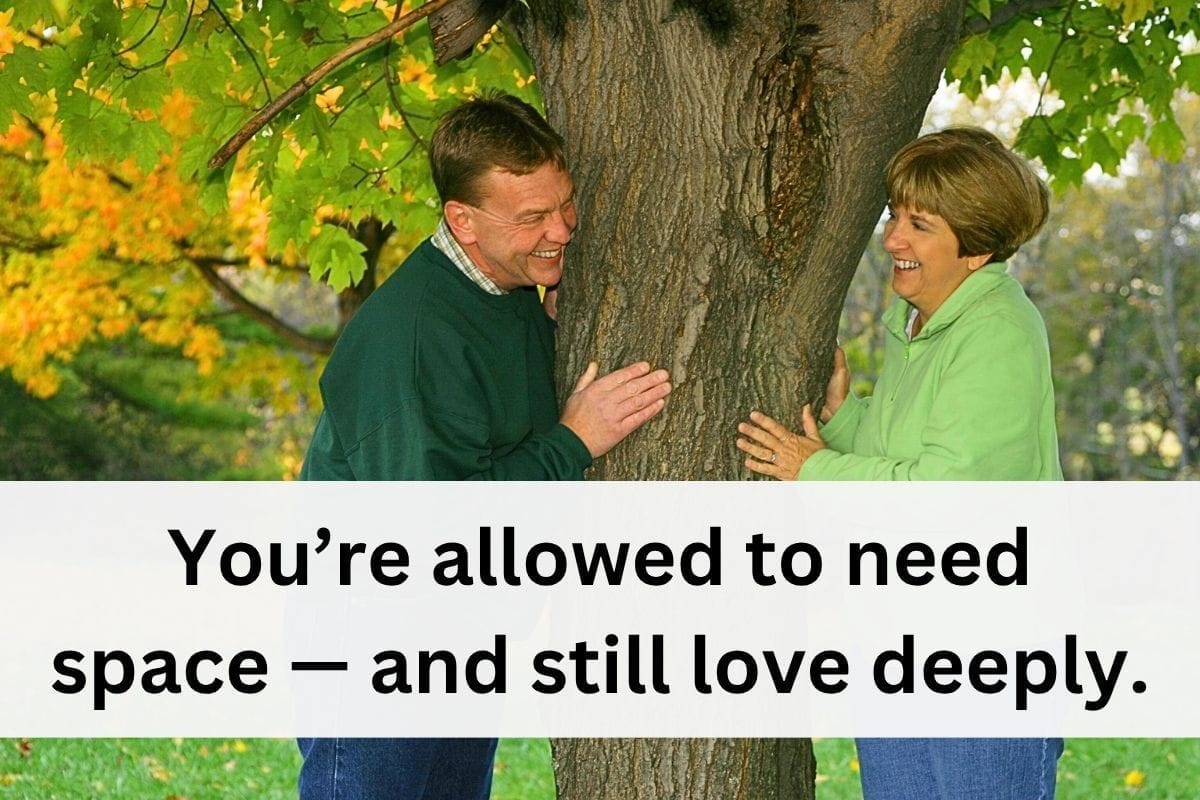
Balancing your needs with your partner’s can be tricky, especially after years of parenting or during new phases like retirement.
If you want some practical ideas on reconnecting with your spouse while still honouring your own space, check out my guide on How to Reconnect with Your Spouse After the Kids Leave. It’s all about finding that sweet spot where closeness and individuality coexist.
That One Invitation You Really Want to Decline
You’ve got some friends visiting who want you to join them at a big charity event. They say it’s for a great cause, and it would mean the world if you came along. But honestly, you’re just not feeling up to it.
You could say:
“That sounds like a wonderful event, and I’m so glad you’re supporting such a great cause. I’m going to have to sit this one out though - I really need some downtime right now. I hope you all have an amazing time, and please keep me in the loop for the next one!"
Managing stress with boundaries isn’t just about keeping your calendar under control - it’s about protecting your energy, your peace of mind, and your sanity.
YOUR MINI ACTION PLAN TO START SETTING BOUNDARIES THIS WEEK
Setting boundaries is one of the most overlooked self-care tips for women over 50 - and it’s free, powerful, and life-changing.
Starting small is key. You don’t have to overhaul your whole life overnight - just pick one place to begin.

Practice Your “No” Lines
Say two of your favourite go-to phrases out loud in front of a mirror. Repetition builds confidence - so they come out naturally when needed.

Ask for Support
Be honest with someone close. A simple, “I need a bit of space right now” can go a long way. Most people will understand more than you think.

Clean Up One Digital Space
Mute the group chat, unfollow draining accounts, or pause notifications. A small declutter helps create more emotional space, too.

Journal It Out
Try this prompt:
“What am I afraid will happen if I say no? And what could I gain if I do?”
Writing this out helps uncover the fears holding you back - and reminds you why your time and peace matter.
FINAL THOUGHTS: SAYING NO ISN'T SELFISH - IT'S SELF-RESPECT
At first, saying no might feel uncomfortable or even a little scary. That’s completely normal. But like any new skill, it gets easier the more you practice.
Think of boundaries as a gift you give yourself - a way to protect your peace, energy, and happiness. And here’s the beautiful part: when you respect yourself, you also show others how to respect you.
Every time you say no, you’re making room for a more joyful, rested, and fulfilled version of yourself. That’s not selfish - it’s an act of self-love and strength. And trust me, you deserve nothing less.
Want Deeper Transformation?
I tried all the usual “fix yourself” stuff. Nothing really clicked - until I focused on mindset. That’s when everything changed.
Mastering the Growth Mindset is a premium 6-day program that can help you let go of old patterns, rewire limiting beliefs, and build true resilience - without burning out.
From self-pressure to self-trust: your glow-up starts within.
*Affiliate note: If you choose to purchase this program, I may earn a commission at no extra cost to you.
Stay Updated - Sign Up for My Newsletter
Stay informed with expert advice for women over 50, right in your inbox. Join me!

About the author
Birgit is the heart behind Your Senior Journey, on a mission to prove that your 50s and beyond can be your most vibrant, fit, and emotionally fulfilling years yet. She doesn't just write about well-being; she empowers women to break free from the "juggle," reclaim their physical vitality, and build relationships that truly flourish.
When she isn't writing, Birgit finds joy in teaching the piano, nurturing her garden, and cherishing time with her family. These moments of creativity and connection bring depth to her work and fuel her passion for helping others thrive.
Your Senior Journey - Supporting women over 50 through life's changes with confidence and healthy living.
© 2026 - yourseniorjourney.com - all rights reserved.
